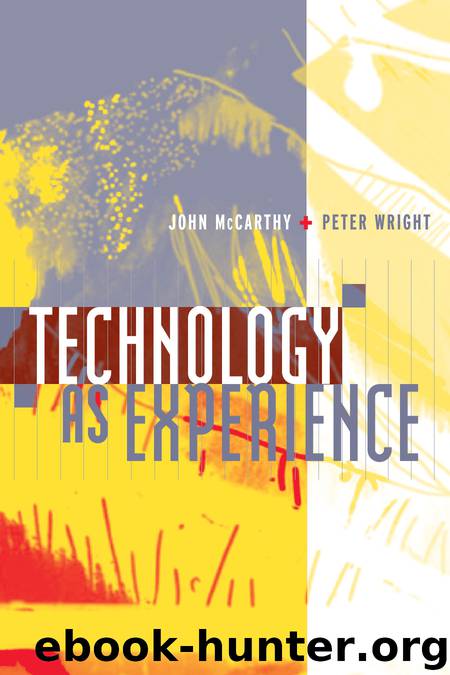Technology As Experience by John McCarthy; Peter Wright

Author:John McCarthy; Peter Wright [Wright, John McCarthy; Peter]
Language: eng
Format: epub
Published: 2011-02-17T05:00:00+00:00
102
Chapter 4
Analyzing an Experience
Dewey referred to segments of ordinary experience marked by a sense of wholeness, unity, and fulfillment as “an experience”: We have an experience when the material experienced runs its course to fulfillment.
Then and then only is it integrated within and demarcated in the general stream of experience from other experiences. A piece of work is finished in a way that is satis-factory; a problem receives its solution; a game is played through; a situation, whether that of eating a meal, playing a game of chess, carrying on a conversation, writing a book, or taking part in a political campaign, is so rounded out that its close is a consummation and not a cessation. Such an experience is a whole and carries with it its own individualizing quality and self-sufficiency. It is an experience. (1934, p. 35)
One question that characterization of an experience leads to is whether the experience has run its course to fulfillment or completion. The experience must come to fruition or at least feel that it is at a natural end. In POGO World, children might have a sense of the fulfillment of a POGO
experience because they have successfully completed a story using the tools, or perhaps because, even though they haven’t managed to finish their story, they got to use a tool they had been waiting to try. Or perhaps the sense of fulfillment could simply be due to having worked well with other children and teachers.
For Dewey, in order for an experience be complete it must be possible to differentiate it from other experiences—to see it as unique. Each experience is a whole that “carries with it its own individualizing quality and self-sufficiency” (Dewey 1934, p. 35). The individualizing quality of the experience differentiates it from what went before and after and also from other experiences that might be considered similar to this particular experience.
Some days in POGO World, children might be very enthusiastic, perhaps because they get to work with a tool that they have come to really enjoy.
Other days might be quite frustrating perhaps because there are too many children and too few tools and the teacher is too controlling. Either way, such days have a uniqueness about them.
In addition to completeness and uniqueness, unifying emotion is necessary for experience to become an experience. For Dewey, emotional unity gives experience an aesthetic quality, even when the experience is not predominantly aesthetic in character, and emotions are the quality of an experience.
They change as the experience changes. They can be clear or fuzzy. They The Threads of Experience
103
move with the experience as well as holding it together. Imagine the children on their first day in POGO World feeling a mixture of excitement at exploring this new environment and some of them being a little fearful and not knowing what is expected of them. But on the next day, having already become comfortable with the tools and with using them to make stories, the children might be more relaxed, perhaps feeling just as excited but worrying less about what it is all about.
Download
This site does not store any files on its server. We only index and link to content provided by other sites. Please contact the content providers to delete copyright contents if any and email us, we'll remove relevant links or contents immediately.
Algorithms of the Intelligent Web by Haralambos Marmanis;Dmitry Babenko(8333)
Test-Driven Development with Java by Alan Mellor(7027)
Data Augmentation with Python by Duc Haba(6951)
Principles of Data Fabric by Sonia Mezzetta(6682)
Learn Blender Simulations the Right Way by Stephen Pearson(6593)
Microservices with Spring Boot 3 and Spring Cloud by Magnus Larsson(6452)
Hadoop in Practice by Alex Holmes(5977)
RPA Solution Architect's Handbook by Sachin Sahgal(5846)
Jquery UI in Action : Master the concepts Of Jquery UI: A Step By Step Approach by ANMOL GOYAL(5833)
The Infinite Retina by Robert Scoble Irena Cronin(5547)
Big Data Analysis with Python by Ivan Marin(5509)
Life 3.0: Being Human in the Age of Artificial Intelligence by Tegmark Max(5184)
Pretrain Vision and Large Language Models in Python by Emily Webber(4471)
Infrastructure as Code for Beginners by Russ McKendrick(4261)
Functional Programming in JavaScript by Mantyla Dan(4059)
The Age of Surveillance Capitalism by Shoshana Zuboff(3983)
WordPress Plugin Development Cookbook by Yannick Lefebvre(3967)
Embracing Microservices Design by Ovais Mehboob Ahmed Khan Nabil Siddiqui and Timothy Oleson(3770)
Applied Machine Learning for Healthcare and Life Sciences Using AWS by Ujjwal Ratan(3745)
